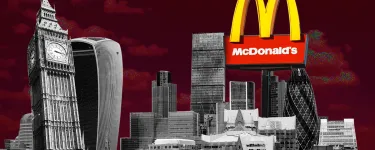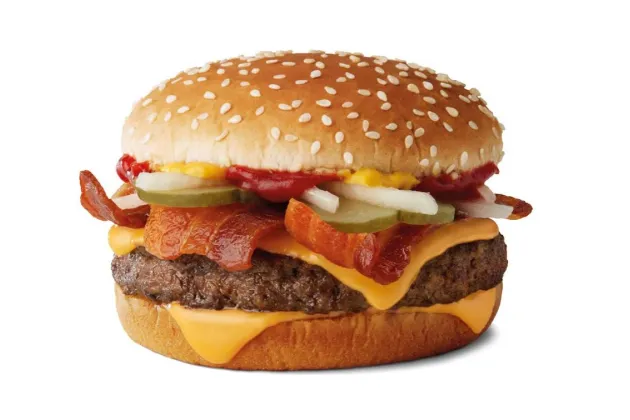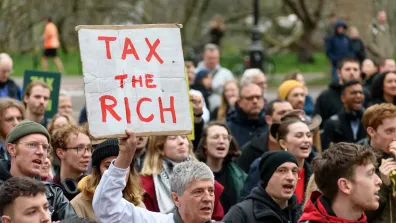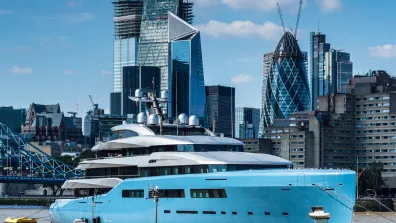Secrets and Fries: McDonald’s £295 million tax dodge

At the same time, McDonald’s was able to grab £872 million in UK government tax breaks and support during the Covid-19 pandemic in 2020; including £229 million from the Coronavirus Job Retention Scheme, and £143 million from the Eat Out to Help Out Scheme.
McDonald’s paid its workers poverty wages whilst they pushed sales through the roof during Covid-19 lockdowns – all while rewarding shareholders with a record £2.9 billion payout, inflated by the hundreds of millions in UK public funds that flowed into McDonald’s UK business.
Now, UK politicians want ordinary workers to pay for the Covid-19 bailouts big business received – instead of cracking down on corporate tax dodgers. That's why we're calling on the UK government’s tax authority, HMRC, to launch a thorough investigation into McDonald’s tax affairs.
Understanding the McTax dodge...
Watch our video explainer of the McTax dodge
Selling ‘ideas’ rather than burgers
McDonald’s operates a franchise business model, which enables it to minimise its tax bills. That’s because profits get taxed where they’re made. So rather than selling burgers, McDonald’s sells the ideas behind the burgers (branding and intellectual property rights). Ideas are much easier to move than a burger restaurant – they can be moved to wherever they’ll get taxed the least, such as a tax haven. This process is called ‘profit-shifting’.
McDonald’s then sets up subsidiary companies – legally separate entities that it owns – that charge franchises for using McDonald’s packaging, trademarks, and other ‘intangible assets. The royalty payments that McDonald’s can then collect on selling its branding and intellectual property rights are enormous – and all count as ‘expenses’ for the franchisee and national McDonald’s subsidiaries, meaning there’s less tax to pay in the country where the burgers are sold.
London tax haven
McDonald’s used the tax haven of Luxembourg to avoid paying €1 billion on its income from across Europe. After its Luxembourg tax arrangements were exposed by War on Want and others in our 2015 UnHappy Meal report, McDonald’s moved its tax base to the City of London.
The European Commission’s subsequent investigation found that McDonald’s tax arrangements were unfair, but not illegal, according to the narrow state aid rules that the European Commission uses to tackle tax dodging. However, after the European Commission started asking questions about these arrangements, McDonald’s decided it was time for a move – to the City of London, UK.
With Brexit on the horizon, placing its international tax base in the UK would move McDonald’s outside of the EU’s jurisdiction, and give it access to the UK’s favourable corporate tax regime. The UK government has been keen to attract multinationals’ intellectual property to London by offering tax breaks. UK parliamentarians must address the City of London’s role as a tax haven for global corporations.
McDonald’s billion dollar IOU to itself
In 2016, McDonald’s newly established UK-based subsidiary, McD Global Franchising Ltd, bought a franchise rights business from another McDonald’s subsidiary, McD APMEA Franchising Pte Ltd in Singapore – for $3.55 billion.
Instead of using cash for this transaction, UK-based McD Global Franchising Ltd paid for the franchise rights business using three loan notes – financial debt instruments similar to an ‘I owe you’ (IOU), a written agreement acknowledging debt. This note was then passed around the world via different McDonald’s subsidiaries, until eventually it came back to McD Global Franchising Ltd in London. Unable to owe itself money, McDonald’s cancelled the IOU.
However, the rights that UK subsidiary McD Global Franchising Ltd had acquired stayed on the books. By using an accounting process called amortisation (similar to depreciation, whereby a business asset loses value over time) – it can claim an expense for at least ten years, for the value of the rights dropping as they age, meaning less profits for it to pay tax on.
In total, this amounts to a potential tax saving of at least $40 million per year or £295 million ($400 million) over a decade. These figures are calculated at the UK corporate tax rate of 19%, and based on the amortisation McDonald’s claimed as a tax expense in 2018.
McDonald’s circular paper transaction enables royalties that McD Global Franchising Ltd receives from McDonald’s entities around the world, including from Europe, the Middle East and Africa, to be shielded from taxation in the UK. This will deprive UK public funds of at least £295 million in tax revenue over ten years.
End the McTax Dodge!
When multinational corporations such as McDonald’s dodge paying taxes, it creates unfair competition for small businesses. McDonald’s growth and increasing market dominance fuels the normalisation of poverty wages and poor working conditions. McDonald’s business model fuels growing inequality.
That’s why we can’t let McDonald’s get away with it. We can’t let McDonald’s get away with granting its shareholders huge payouts off the back of public subsidies and tax breaks, whilst its workers were paid poverty wages to put their health at risk by working during Covid-19 lockdowns, furloughed workers suffered, and thousands of local businesses were going under.
We must not let politicians force ordinary working people to fund the bailouts big business received, instead of cracking down on corporate tax dodgers. We must demand politicians rebalance our rigged economy in favour of workers and the communities where multinationals operate.
HMRC must investigate McDonald’s.




